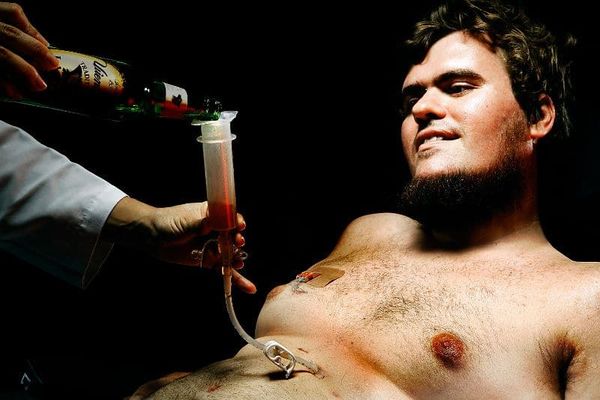Eye For Film >> Movies >> TransFatty Lives (2015) Film Review
TransFatty Lives
Reviewed by: Amber Wilkinson

The title of this documentary and the Tribeca Film Festival poster - which shows a chubby guy being given a bottle of beer through a tube to his stomach - are likely to give people the impression that this is simply the latest health documentary about American weight gain. In fact, this is a much more personal and, by turns, tragic and uplifting story than that, as the film tells the tale of its director and narrator Patrick O'Brien, who, at just 30, was diagnosed with the motor neuron disease Amyotrophic Lateral Sclerosis. Like the world's other most famous sufferer of the disorder, physicist Stephen Hawking, he is given a severe prognosis and low life expectancy by doctors, who outline the way in which the disease will gradually stop his muscles responding to messages from his brain.
The director is not interested in making a medical documentary, but rather in creating a visual account that can be viewed by his son - who was conceived and born after O'Brien had been diagnosed with the disease for some time. The result is an emotionally raw account of his decline but also a testament to O'Brien's creativity that shines a light on the way that debilitating rare physical diseases like this are often neglected by society and how this, in turn, can have a big impact on a sufferer's mental state.
O'Brien already had a vibrant creative life when he was diagnosed. Known online by the moniker DJ TransFatty, he had also shot a number of short films, and home video footage shows his irrepressible energy. This is in sharp contrast to the computerised tones of the voice-over, read by O'Brien after the tracheotomy that ended the use of his vocal cords.
O'Brien describes his initial reactions to the disease, "drugs, drink etc was our way of coping," he says but he also describes the gradual loss of his motor functions as "englightenment by shotgun". As his speaking becomes increasingly slurred, his words appear at subtitles on the screen, but in one of the many personal touches that keep us intimately connected to O'Brien they appear just a word or two at a time, as he says them, so we move along at his pace. In a typically quirky move, he compares the shutting down of his bodily functions to the closure of Howard Johnson restaurants - the idea of something comfortable and seemingly ever-present fading away.
It is this sort of imagery that really makes the story hit home. This isn't a case of a documentarian looking in at O'Brien - as Stephen Finnigan's Hawking did with the physicist - but of the filmmaker showing us the affects of the disease from within. An animated sequence, for example, shows us O'Brien's limbs in coffins, as he talks about saying Farewell To Arms; elsewhere some graphic imagery illustrates how, in the heat of despair regarding his son, he has come to view the mother of his child in a less than glowing light.
O'Brien doesn't wallow in his disease but he is open about it in ways that are hard-hitting - everything from the joy of friendship to the discomfort of needing help to evacuate your bowels are laid bare in ways that only an 'insider' can. Along the way, he almost casually documents the lack of facilities - and high price of care - for sufferers in the US, which raise uncomfortable questions about the very real 'cost of living' for him.
In structural terms, the film sometimes suffers from an excess of energy. This is clearly one of O'Brien's few outlets for his feelings, so he pours everything in, with the early scenes suffering from attention deficit, while later some imagery feels pushed right to the edge. But that's all part of the punk personality of the filmmaker who, even at his lowest, still displays a remarkable resilience. He is bold in his approach and unafraid of risk-taking, choices that offer a clear-sighted window into his world for those of us lucky enough to have full health and a rallying call to others experiencing this condition from within. O'Brien is doing a lot more than merely living, he is creating, rabble-rousing and challenging.
Reviewed on: 18 Apr 2015














